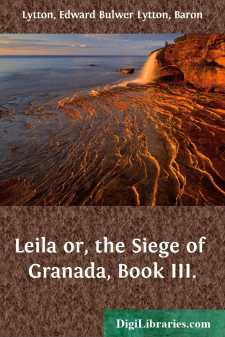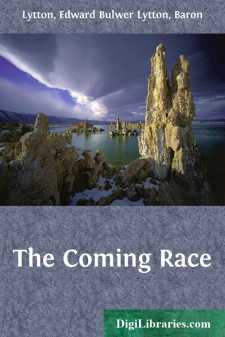Categories
- Antiques & Collectibles 13
- Architecture 36
- Art 48
- Bibles 22
- Biography & Autobiography 813
- Body, Mind & Spirit 142
- Business & Economics 28
- Children's Books 17
- Children's Fiction 14
- Computers 4
- Cooking 94
- Crafts & Hobbies 4
- Drama 346
- Education 46
- Family & Relationships 57
- Fiction 11829
- Games 19
- Gardening 17
- Health & Fitness 34
- History 1377
- House & Home 1
- Humor 147
- Juvenile Fiction 1873
- Juvenile Nonfiction 202
- Language Arts & Disciplines 88
- Law 16
- Literary Collections 686
- Literary Criticism 179
- Mathematics 13
- Medical 41
- Music 40
- Nature 179
- Non-Classifiable 1768
- Performing Arts 7
- Periodicals 1453
- Philosophy 64
- Photography 2
- Poetry 896
- Political Science 203
- Psychology 42
- Reference 154
- Religion 513
- Science 126
- Self-Help 84
- Social Science 81
- Sports & Recreation 34
- Study Aids 3
- Technology & Engineering 59
- Transportation 23
- Travel 463
- True Crime 29
Edward Bulwer Lytton Lytton
Edward Bulwer Lytton (1803–1873) was a prominent English writer, politician, and playwright, known for his prolific output in various literary genres. He authored the famous opening line "It was a dark and stormy night" in his novel "Paul Clifford" (1830) and popularized phrases such as "the pen is mightier than the sword." Lytton also served in the British Parliament and held the title of 1st Baron Lytton, significantly influencing Victorian literature and politics.
Author's Books:
Sort by:
CHAPTER I. ISABEL AND THE JEWISH MAIDEN. While this scene took place before the tribunal of Torquemada, Leila had been summoned from the indulgence of fears, which her gentle nature and her luxurious nurturing had ill-fitted her to contend against, to the presence of the queen. That gifted and high-spirited princess, whose virtues were her own, whose faults were of her age, was not, it is true, without...
more...
CHAPTER I. THE ENCHANTER AND THE WARRIOR. It was the summer of the year 1491, and the armies of Ferdinand and Isabel invested the city of Granada. The night was not far advanced; and the moon, which broke through the transparent air of Andalusia, shone calmly over the immense and murmuring encampment of the Spanish foe, and touched with a hazy light the snow-capped summits of the Sierra Nevada,...
more...
CHAPTER. I. LEILA IN THE CASTLE—THE SIEGE. The calmer contemplations and more holy anxieties of Leila were, at length, broken in upon by intelligence, the fearful interest of which absorbed the whole mind and care of every inhabitant of the castle. Boabdil el Chico had taken the field, at the head of a numerous army. Rapidly scouring the country, he had descended, one after one, upon the principal...
more...
CHAPTER I. THE GREAT BATTLE. The day slowly dawned upon that awful night; and the Moors, still upon the battlements of Granada, beheld the whole army of Ferdinand on its march towards their wails. At a distance lay the wrecks of the blackened and smouldering camp; while before them, gaudy and glittering pennons waving, and trumpets sounding, came the exultant legions of the foe. The Moors could...
more...
CHAPTER I. THE ENCHANTER AND THE WARRIOR. It was the summer of the year 1491, and the armies of Ferdinand andIsabel invested the city of Granada. The night was not far advanced; and the moon, which broke through the transparent air of Andalusia, shone calmly over the immense and murmuring encampment of the Spanish foe, and touched with a hazy light the snow- capped summits of the Sierra Nevada,...
more...
CHAPTER I. THE ROYAL TENT OF SPAIN.—THE KING AND THE DOMINICAN—THE VISITOR AND THE HOSTAGE. Our narrative now summons us to the Christian army, and to the tent in which the Spanish king held nocturnal counsel with some of his more confidential warriors and advisers. Ferdinand had taken the field with all the pomp and circumstance of a tournament rather than of a campaign; and his pavilion literally...
more...
Chapter I. I am a native of _____, in the United States of America. My ancestors migrated from England in the reign of Charles II.; and my grandfather was not undistinguished in the War of Independence. My family, therefore, enjoyed a somewhat high social position in right of birth; and being also opulent, they were considered disqualified for the public service. My father once ran for Congress, but...
more...
INTRODUCTION. One of the peculiarities of Bulwer was his passion for occult studies. They had a charm for him early in life, and he pursued them with the earnestness which characterised his pursuit of other studies. He became absorbed in wizard lore; he equipped himself with magical implements,—with rods for transmitting influence, and crystal balls in which to discern coming scenes and persons; and...
more...
Chapter 1.I. The Brothers. The celebrated name which forms the title to this work will sufficiently apprise the reader that it is in the earlier half of the fourteenth century that my story opens. It was on a summer evening that two youths might be seen walking beside the banks of the Tiber, not far from that part of its winding course which sweeps by the base of Mount Aventine. The path they had...
more...
MY DEAR AULDJO,—Permit me, as a memento of the pleasant hours we passed together, and the intimacy we formed by the winding shores and the rosy seas of the old Parthenope, to dedicate to you this romance. It was written in perhaps the happiest period of my literary life,—when success began to brighten upon my labours, and it seemed to me a fine thing to make a name. Reputation, like all...
more...











